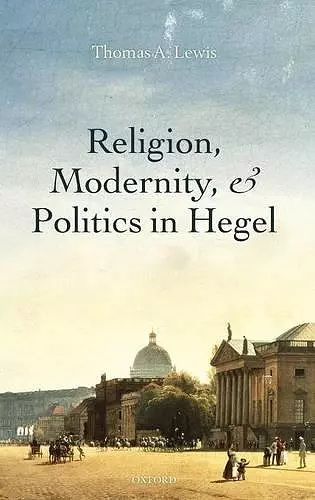Religion, Modernity, and Politics in Hegel
Format:Hardback
Publisher:Oxford University Press
Published:28th Jul '11
Currently unavailable, and unfortunately no date known when it will be back
This hardback is available in another edition too:
- Paperback£29.99(9780199678310)

Religion, Modernity, and Politics in Hegel analyzes Hegel's philosophy of religion and develops its significance for ongoing debates about the relation between religion and politics as well as the history of the conceptualization of religion. One of the most vital currents in contemporary Hegel scholarship argues that Hegel radicalizes, rather than reneges upon, Kant's critique of metaphysics. Critics have claimed that this new scholarship cannot account for Hegel's treatment of religion. Addressing an important lacuna in the scholarship, Lewis argues that reading Hegel's philosophy of religion in relation to these non-traditional interpretations of his intellectual project as a whole generates a new understanding of Hegel as well as a new perspective on religion, politics, and modernity. In relation to the conceptualization of religion, Hegel's complex and multi-faceted account of religion reconciles common contrasts, presenting religion as both personal and social, both emotional and cognitive, both theoretical and practical. In relation to politics, it is public without being theocratic and gives a decisive importance to individual conscience. Attending closely to Hegel's social, political, and intellectual context, the book begins with Hegel's early concerns with a modern civil religion in the tumultuous 1790s. After analyzing Hegel's crucial engagement with post-Kantian idealism, Lewis elaborates Hegel's mature philosophy of religion as presented in his Berlin Lectures on the Philosophy of Religion. This unique engagement between Hegel and the contemporary study of religion thus advances the non-traditionalist interpretation of Hegel's project as a whole and inspires a promising conception of religion that challenges those that have dominated both public discourse and religious studies scholarship.
For two decades, there has been a vigorous debate over the claim that Hegel, far from reverting to a pre-Kantian form of metaphysics in claiming knowledge of absolute spirit, actually radicalized Kant's critique of transcendent metaphysics. Scholars who defend this claim have tested it in readings of the Logic, the Phenomenology of Spirit, and Hegel's practical philosophy. Thomas A. Lewis is the first to show that this approach can be extended to the Lectures on the Philosophy of Religion, the aspect of Hegel's philosophy that appears to be most resistant to being read nonmetaphysically. The result is a major development in Hegel scholarship, and it will require historians of religious thought to rethink Hegel's relationship to his successors as well as to his predecessors. This book deserves a wide audience in philosophy, intellectual history, and religious studies. * Jeffrey Stout, author of Blessed Are the Organized *
ISBN: 9780199595594
Dimensions: 240mm x 167mm x 31mm
Weight: 616g
292 pages